The three elements of making a good cup of coffee-a good barista must see
There are many factors that affect the taste of coffee, a variety of subtle changes will have an impact on the taste of coffee, such as weather changes, etc., not to mention the small, from a big point of view: raw beans account for 60% of the factors that determine the taste of coffee, roasting accounts for 30%, and extraction accounts for 10%.
1 =

1. Effect of raw beans on coffee
At present, there are mainly two kinds of coffee beans in circulation on the market: Robusta and Arabica, of which Arabica accounts for about 65%. Both kinds of coffee beans have their own characteristics.

Robota beans have a single taste, bitter, and do not taste good enough. They are generally used in instant coffee, canned coffee, liquid coffee and other industrial production coffee, and a small part of them are used to prepare Italian concentrated mixed beans. It can improve the mellowness of espresso. Caffeine is also high, about 3%.
Arabica beans are rich in aroma and taste, and taste softer and palatable. So it occupies a dominant position in the market. The caffeine content is about 1.5%.

Thus it can be seen that the beans chosen for good coffee should be Arabica, but only Arabica is too general. Arabica coffee can also be good or bad due to differences in geographical location, growing environment, and planting methods.
two。 Effect of roasting on coffee
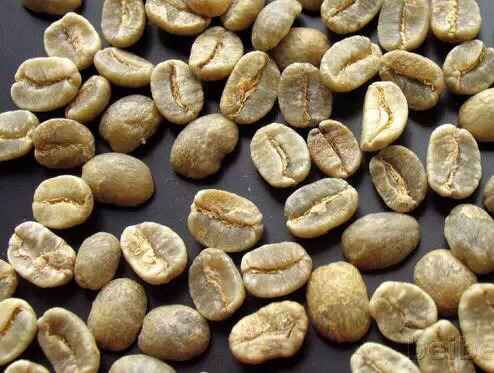
Every coffee producing country has its own raw bean rating system, and high-quality coffee beans are to select the best beans in each country.
With good "ingredients", how to stir-fry delicious cola, this is the time to test the heat. Baking is such a process of mastering "heat".
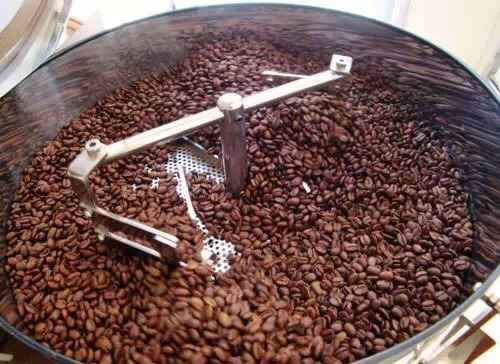
However, roasting technology is the most complex and difficult technology in coffee technology. Bakers should not only fully understand the characteristics of coffee beans from each producing area, but also have a good grasp of beans in each baking stage in order to find the best baking point.
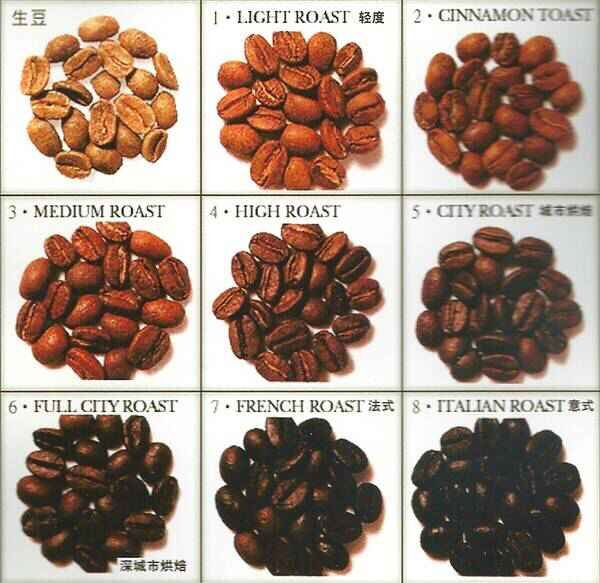
The baking degree is generally divided into four degrees: shallow, medium, deep and heavy, and the specific subdivision of each degree can be divided into two, that is, shallow baking includes Light (light) Cinnamon (cinnamon), moderate baking includes Medium (moderate) High (medium high), deep baking includes City (city) Full-city (deep city), heavy baking includes Italy (Italian) French (French).
The general rule is: shallow baking has obvious sour taste, while deep baking has a strong bitter taste.
3. Effect of extraction on Coffee

Although the first 90% is digitally decisive, a small percentage of 10% has the potential to subvert 90% of the effort for coffee production.
At present, there are a variety of popular coffee making utensils and techniques, some like hand-brewed coffee, some prefer siphon pots, and some prefer mocha pots, each of which has its own characteristics, but generally speaking, hand brewing is highly controllable and can best express the delicate original taste of coffee.
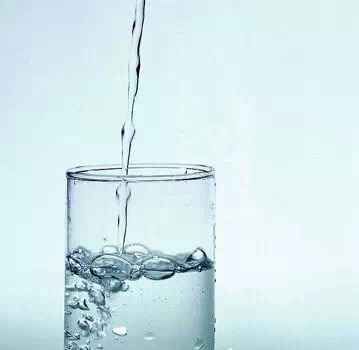
The main factors that affect the quality of hand-brewed coffee are as follows:
Freshness of ● coffee beans
The roasted coffee beans have the best flavor within a week. with the passage of time, the aromatic molecules in the coffee beans continue to volatilize and absorb the peculiar smell in the air, the flavor of the coffee beans will be gradually lost, and the flavor will be lost after a month, only bitterness and bad taste remain.
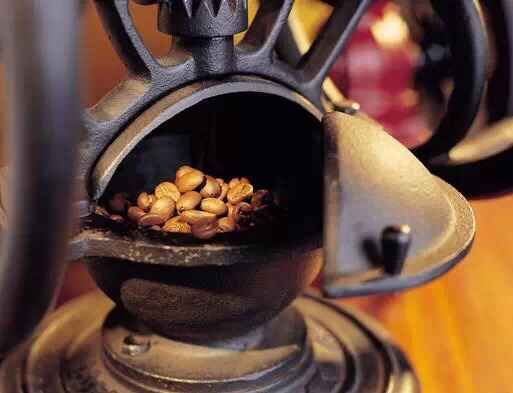
● water
98% of a cup of coffee is water. The quality and temperature of water affect the taste of coffee to some extent. In general, the trace elements contained in tap water or mineral water will react with the substances in coffee and affect the taste of coffee, and the excellent water quality will also have a bad effect on the taste of coffee, so pure water should be used in coffee extraction.
Secondly, about the water temperature: the most suitable water temperature for coffee extraction is between 88 and 93 degrees. Too high temperature will increase the bitterness of coffee, while too low temperature will make coffee too sour.

● extraction time
A reasonable grasp of extraction time is a point to pay attention to to make a good cup of coffee. Too long extraction time will cause excessive extraction, so that the bitter taste and bad ingredients in the coffee will be extracted, on the contrary, if the extraction time is too short, it will cause insufficient extraction, the coffee taste is too light, the taste is not rich enough.

Factors of ● baristas and drinkers
The previous ones are all objective factors, but this one is relatively subjective. Technical factors aside, this cup of coffee tastes good only when a barista is confident and earnest in making a cup of coffee. And coffee drinkers, according to the mood, the degree of understanding of coffee is different, can feel the taste of coffee will be very different.

So don't underestimate the 10% ratio, the extraction of coffee also has a great effect on the taste.
Important Notice :
前街咖啡 FrontStreet Coffee has moved to new addredd:
FrontStreet Coffee Address: 315,Donghua East Road,GuangZhou
Tel:020 38364473
- Prev
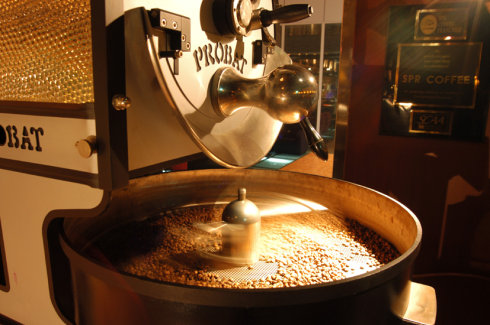
Introduction to Coffee-basic knowledge of roasting
Raw coffee beans themselves do not have any aroma of coffee, only after fried, can you smell the strong aroma of coffee. So the roasting of coffee beans is the transformation process of the internal components of coffee beans, only after roasting to produce ingredients that can release the aroma of coffee, we can smell the aroma of coffee. But in the roasting process of coffee beans, the change in composition
- Next
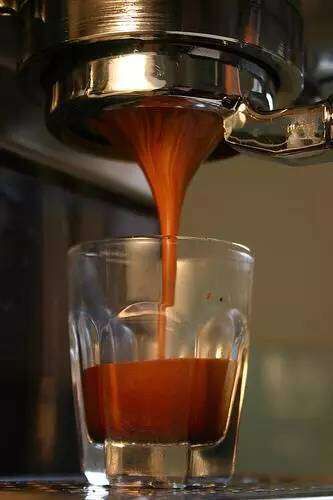
The origin of the name of coffee-let you understand the romance of coffee
When you make coffee in a cafe, many people order lattes and Bumoka, but do you know how these names come from? It's all interesting, especially the last one, quite wonderful!-1-Espresso espresso in the early 20th century, an impatient engineer living near Napoli, Italy, was impatient with dripping coffee for too long, so he was waiting for time to figure out
Related
- What is the meaning of lactic acid fermentation with coffee bean treatment?
- How to judge the state of foam by sound?
- How does the latte pull out the unicorn pattern? Come to get for a little trick to improve the flower pull!
- Will flower pulling affect the taste of the latte?
- Do you know the history of coffee?
- The difference between honey treatment and sun washing what is raisin honey treatment?
- What kind of milk can a novice use to make coffee foam to keep the foam longer? The correct method and skills of milking tutorial sharing
- Why do washed coffee beans taste sour? Flavor characteristics of washed Coffee
- Introduction to the skill of how to practice the size and height of water injection around the circle of hand-brewed coffee
- How do beginners practice coffee flower drawing from scratch?

